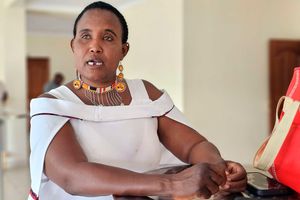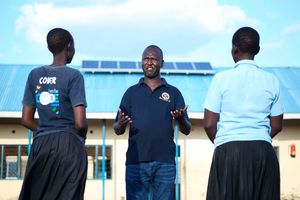Vaginal ring: Women to access long-acting and self-controlled HIV prevention method

This innovative device has already received regulatory approval in 11 countries across Eastern and Southern Africa, including Kenya, Uganda, and Rwanda
What you need to know:
- It is infused with the antiretroviral drug dapivirine, which is released slowly over the course of a month, to prevent the virus from establishing an infection.
- Experts say that it requires minimal upkeep—once in place, it only needs to be replaced once a month.
Women across the country will soon have access to free vaginal rings designed to prevent HIV, thanks to an initiative by the Global Fund in partnership with the Children’s Investment Fund Foundation (CIFF).
The partnership has committed Sh258 million ( $2 million ) over the next year to procure up to 150,000 HIV prevention rings for countries receiving Global Fund grants.
The one-month ring currently costs Sh1,545 ($12.8), but the initiative has announced it will create a bridge to the three-month PrEP ring, which will cost less than Sh2,060 ($16) excluding distribution, representing a nearly 60 per cent drop in price per month. The Sh258 million is expected to cover the initial batch that reaches the customer.
The dapivirine vaginal ring, also known as the DapiRing, is a long-acting HIV pre-exposure prophylaxis (PrEP) option specifically designed in the form of a small, flexible silicone ring, inserted into the vagina to provide discreet, and continuous protection against HIV during vaginal sex.
It is infused with the antiretroviral drug dapivirine, which is released slowly over the course of a month, to prevent the virus from establishing an infection. Experts say that it requires minimal upkeep—once in place, it only needs to be replaced once a month.
This innovative device has already received regulatory approval in 11 countries across Eastern and Southern Africa, including Kenya, Uganda, and Rwanda.
In these countries, women and girls over the age of 15 bear the brunt of the HIV epidemic, accounting for 61 per cent, 61.4 per cent, and 62.86 per cent of those living with HIV, respectively.
This initiative marks a significant step toward empowering women with more options to protect themselves against HIV and reducing the high rates of infections in the region without having to rely on male partners’ cooperation.
“The PrEP ring gives women and girls a discrete option that is entirely within their control,” said Miles Kemplay, Executive Director, Sexual and Reproductive Health and Rights (SRHR), CIFF. “For too long, price points have made this option inaccessible – this partnership is the first step in making the market more sustainable and increasing access for those who need it.”
The PrEP ring is produced by Sever Pharma Solutions in Sweden for the Population Council. A next-generation PrEP ring, offering protection for three months, is expected to undergo regulatory review soon.
So far, regulatory authorities in Kenya, Uganda, Rwanda, Zambia, Malawi, Botswana, Eswatini, Lesotho, Namibia, South Africa, and Zimbabwe have approved the PrEP ring, with additional countries currently reviewing regulatory submissions.
Since 2021, the World Health Organization (WHO) has recommended the PrEP ring as an additional prevention option for women at substantial risk of HIV infection, as part of a combination prevention approach.
Already, the Global Fund has facilitated the procurement of the PrEP ring in Uganda, South Africa, Ghana, Eswatini, Mozambique, Cambodia, and Indonesia, with procurement in Mozambique and Uganda partially supported by CIFF’s PrEP Matching Fund.
Starting in October, the partnership between CIFF and the Global Fund aims to support the early introduction of the PrEP ring, laying the groundwork for broader market adoption.
Working alongside other partners, including Unitaid, the collaboration also seeks to pave the way for the lower-cost, three-month PrEP ring and an African-manufactured version, ultimately driving down prices in the long term.
The one-month ring currently costs Sh1,545 ($12.8), but the initiative has announced it will create a bridge to the three-month PrEP ring, which will cost less than Sh2,060 ($16) excluding distribution, representing a nearly 60 per cent drop in price per month.
Partners also announced that they have identified many opportunities for further price reductions, which are currently being explored.
“The ring is a powerful tool that is revolutionary as the first approved, long-acting prevention tool, particularly for women and adolescent girls, who often cannot negotiate condom use and find the pill burden of oral PrEP not discrete enough,” said Executive Director of Advocacy for Prevention of HIV and AIDS (APHA) in South Africa and Chair of the African Women Prevention Community Accountability Board, Yvette Raphael. “It gives women and girls another option to choose from.
HIV remains a major global health challenge, with an estimated 39.9 million people living with the virus worldwide, and 1.2 million people having contracted the virus in 2022, according to the WHO.
Countries in sub-Saharan Africa continue to face significant barriers to prevention and care and have the highest rates of HIV despite significant progress in reducing new infections and expanding access to treatment.
In many regions, cultural norms, gender inequalities, and limited access to healthcare contribute to a heightened vulnerability among women.
“In many areas of the world, the rate of new HIV infections among adolescent girls and young women is more than three times the rate among adolescent boys and young men,” said Executive Director of the Global Fund, Peter Sands.
“This is unacceptable. We are convinced that this new PrEP ring can have a revolutionary impact. Girls and women have spoken up that they want the PrEP ring, and today’s announcement is one more stepping stone in a series of innovative approaches to give it to them.”




